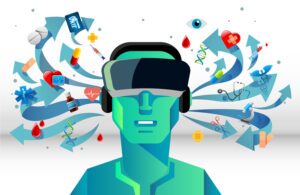
XRHealth, a virtual clinic, has secured $6 million in funding, which it will use to support its recent merger with Amelia Virtual Care and develop an AI-based clinician, the company announced Tuesday at CES 2024.
Boston-based XRHealth offers FDA-cleared virtual reality and augmented reality technology to treat patients in their homes for a variety of use cases across mental, physical and occupational health. This includes the treatment of chronic pain, anxiety, fibromyalgia and dementia. The company sells its technology to hospitals and rehab centers. It also operates its own virtual clinics that include clinicians, physical therapists, occupational therapists, social workers and psychologists. In this model, XRHealth ships its headsets to patients’ homes, treats them remotely and then bills insurance companies. When the patient uses the headset, the clinician is always supporting the patient virtually.

With the Rise of AI, What IP Disputes in Healthcare Are Likely to Emerge?
Munck Wilson Mandala Partner Greg Howison shared his perspective on some of the legal ramifications around AI, IP, connected devices and the data they generate, in response to emailed questions.
“We still believe the clinician needs to be an integral part of the software,” said Eran Orr, CEO and founder of XRHealth, in an interview. “So the clinician is the one basically operating different types of software and then utilizing whatever they see fit.”
The $6 million in funding was led by Asabys Partners and included participation from NOVA Prime Fund. In total, XRHealth has raised more than $40 million. NOVA Prime Fund invested in the startup because its “use of advanced technologies in its healthcare platform sets it apart as an innovative solution for healthcare,” said Ali Diallo, managing director at NOVA Prime Fund, in a statement.
The financing will support XRHealth’s merger with Amelia Virtual Care. XRHealth was focused on physical therapy, while Amelia Virtual Care was focused on mental health. The merger was announced last year with the intent to create a “holistic package” for patients, Orr said.
XRHealth will also use the funding to develop an AI-based clinician that can offer mental, physical and occupational health treatment.
“I think in the next few years, you’ll put a VR headset on, you’ll see someone who looks like your clinician who will give you guidance or even treat you. … The reason why it’s so important is because we don’t have enough clinicians today to treat patients across the board,” Orr said. “We need to harness technology in order to allow people to get treatment. … Part of the funding will establish those foundations to allow us to get to that vision.”
Looking ahead, Orr said he hopes to push the company to be more profitable while also continuing to grow the business.
“You need to do both. We need to be profitable and efficient and still grow as a startup,” he said.
Several other companies are also using VR to treat health conditions, including BehaVR, AppliedVR and MyndVR.
Picture: exdez, Getty Images














